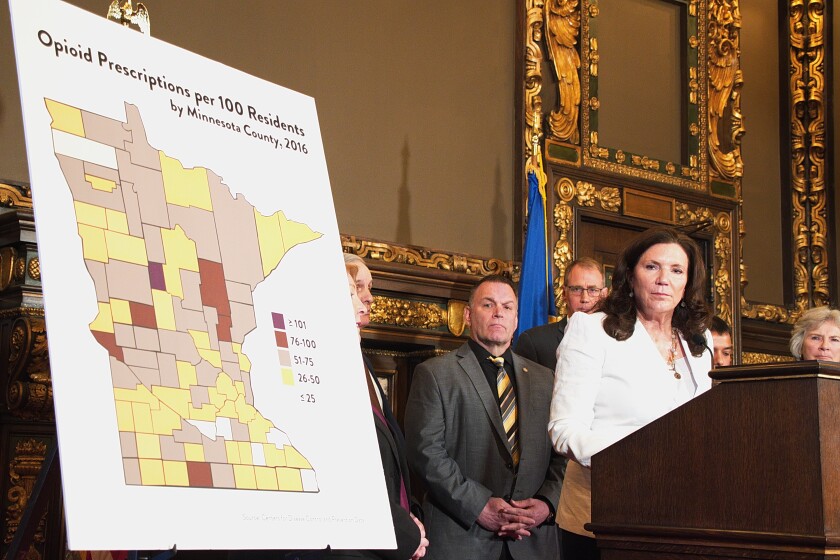ST. PAUL - How to deal with opioid abuse is one of those issues that everyone agrees needs legislation, but they cannot agree on details.
Many Democrats and at least some Republicans say drug companies that make and sell the powerful painkillers should pay for opioid abuse prevention and treatment. That does not fly well with many Republicans, although Sen. Julie Rosen of Vernon Center is continuing her fight to collect a fee (or tax, if you will) on opioids sold in the state.
ADVERTISEMENT
The so-called penny-a-pill concept has been stripped from legislation by Rep. Dave Baker, R-Willmar, but he would like to put it back. The House does not seem likely to do that.
Democratic Gov. Mark Dayton is pushing the penny-a-pill provision, and appears frustrated that Republicans who control the Legislature won't go along.
"We need to do something significant here," said Baker, who lost a son to opioid abuse.
He continues to express optimism about finding funding for prevention and treatment programs.
The issue is one that could be in danger of getting lost as most attention is focused on adjusting the two-year, $46 billion state budget and passing legislation to ensure that Minnesotans are not hurt by a massive new federal tax law.
The best opioid news has been grants of $75,000 or $100,000 to eight greater Minnesota entities: Douglas County Hospital Alexandria Clinic; Carris Health Redwood Falls Clinic; Chippewa County Montevideo Hospital; Fairview Mesaba Clinics in Hibbing, Nashwauk and Mountain Iron; FirstLight Health System in Mora, Pine City and Hinckley; Lake Region Healthcare in Fergus Falls; Mille Lacs Band of Ojibwe; and Riverview Healthcare Center in Aitkin, Garrison and McGregor.
Health Commissioner Jan Malcolm said the grants will establish pilot programs based on things St. Gabriel's Health in Little Falls has done to reduce opioid abuse. The prime action taken in the central Minnesota community has been to reduce opioid prescriptions.
ADVERTISEMENT
Besides reducing the reliance on opioids, using less expensive medicine has saved money.
Big bills, big danger
Dayton is trying to get the message to legislators that the massive funding bill they are expected to pass, packed full of policy provisions that have nothing to do with spending, could be vetoed.
Time and time again, Dayton has said he will veto a bill if it contains provisions he cannot accept. And unlike other years, he pledges not to call lawmakers back to special session to finish their work (unless, he says, it is snowing in St. Paul on July 4).
Technically, legislators have to do nothing this year since they passed the state budget last year. However, they and Dayton would like to adjust the budget to take into account a $329 million surplus, match state taxes with new federal tax law, pass a public works funding bill and approve an anti-opioids measure.
The big bill, which folds together spending changes in all areas of state government, contains policy provisions such as prescription drug regulation, a ban on going slower than other traffic in the left lane, fish stocking and collecting information on sex trafficking, Sen. John Marty, D-Roseville, said. That simply is too much for the public to digest, he said. Lawmakers have trouble with that, too.
State dumps wild rice rule
ADVERTISEMENT
A decade-long effort by the Minnesota Pollution Control Agency to reduce pollutants in wild rice waters has ended.
"We've heard many, many voices, including the administrative law judge on this topic, and the message is clear," Pollution Control Commissioner John Linc Stine said. "Although the science is accurate, when it comes to how best to apply the science and affordably implement the rule, we still have more work to do. So, the MPCA will withdraw it from the rulemaking process. We look forward to working with legislators over the next three weeks to determine an alternative path forward."
The Republican-controlled Legislature is advancing legislation to stop the rulemaking process and the judge recently applied the brakes on the long-standing effort.
The state approved a limit on sulfate in 1973, but it has not been enforced. In recent years, Stine's agency has worked toward its implementation.
Wild rice is important culturally for many American Indians, plus it is a money-making crop and part of the state's ecosystem.
The agency has been concerned that sulfates were coming from taconite mines and sewage treatment plants.
No to fake service dogs
ADVERTISEMENT
Dayton has signed a bill making it illegal to pass an untrained animal off as a service animal.
It is a problem most Minnesotans knew nothing about, but disabled people who rely on service animals, mostly dogs, have reported issues. For instance, an untrained dog could cause a disruption in a store, while a properly trained one stays by its master's side.
"The reality of the issue is that their actions carry real consequences," Sen. Justin Eichorn, R-Grand Rapids, said. "When people misrepresent their animals, they damage the reputation and acceptance of valid service animals, diminishing people with disabilities who truly need these animals to assist them."
The new law places a fine of $100 on people who misrepresent their animals as trained services animals.
Senators unanimously approved the bill, and the House followed with a 125-1 vote.









